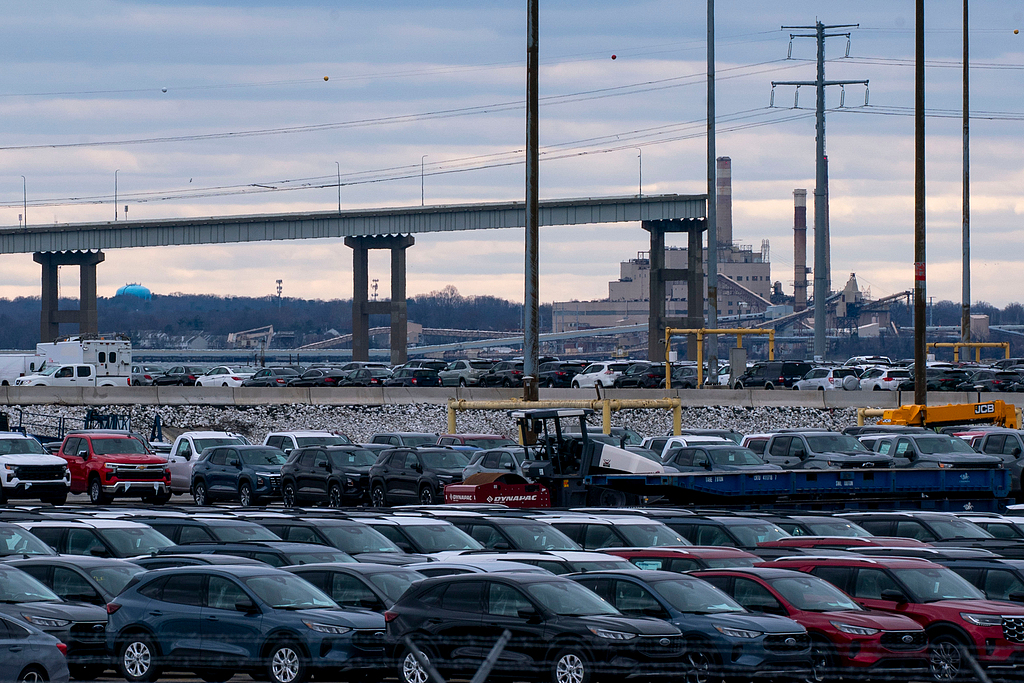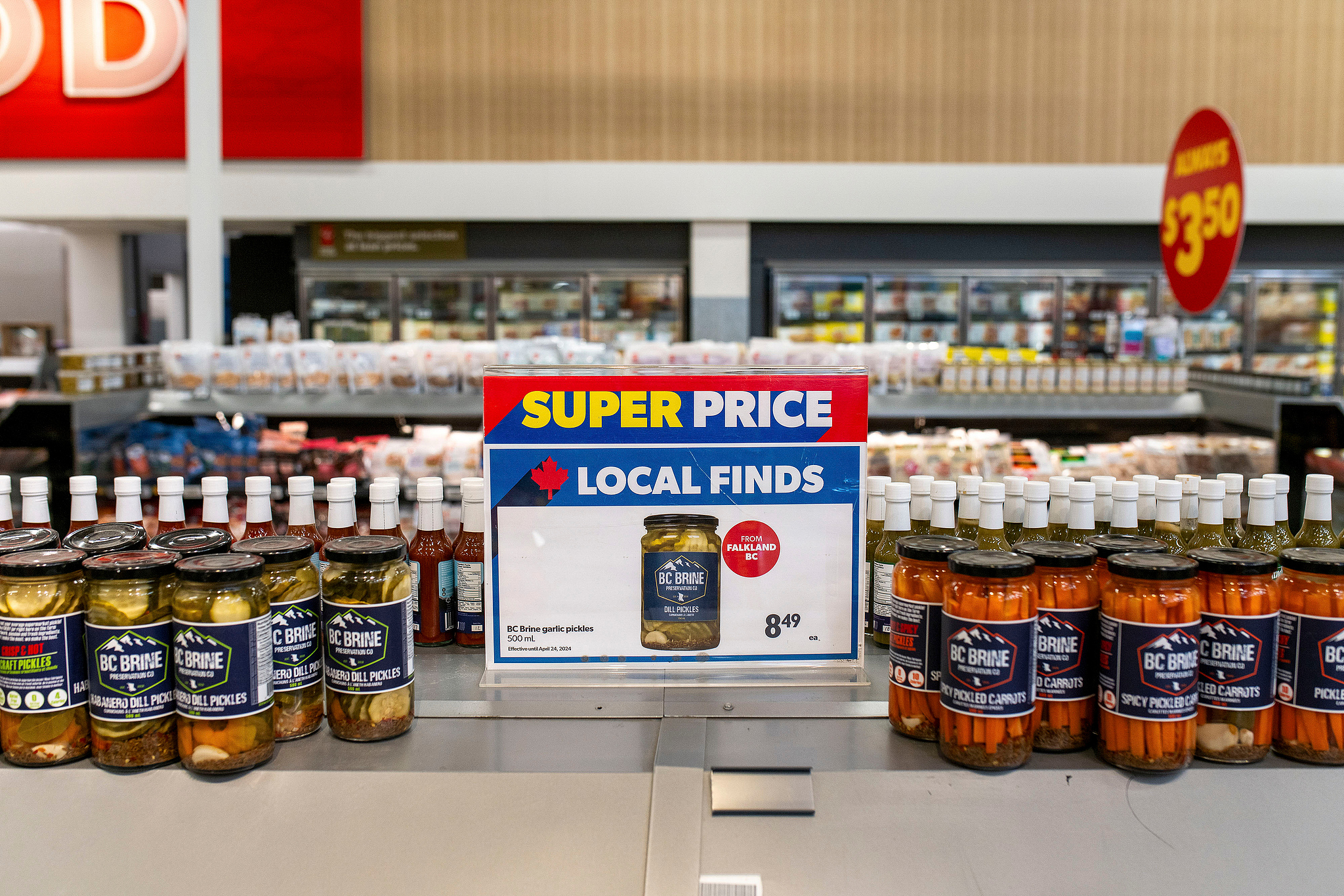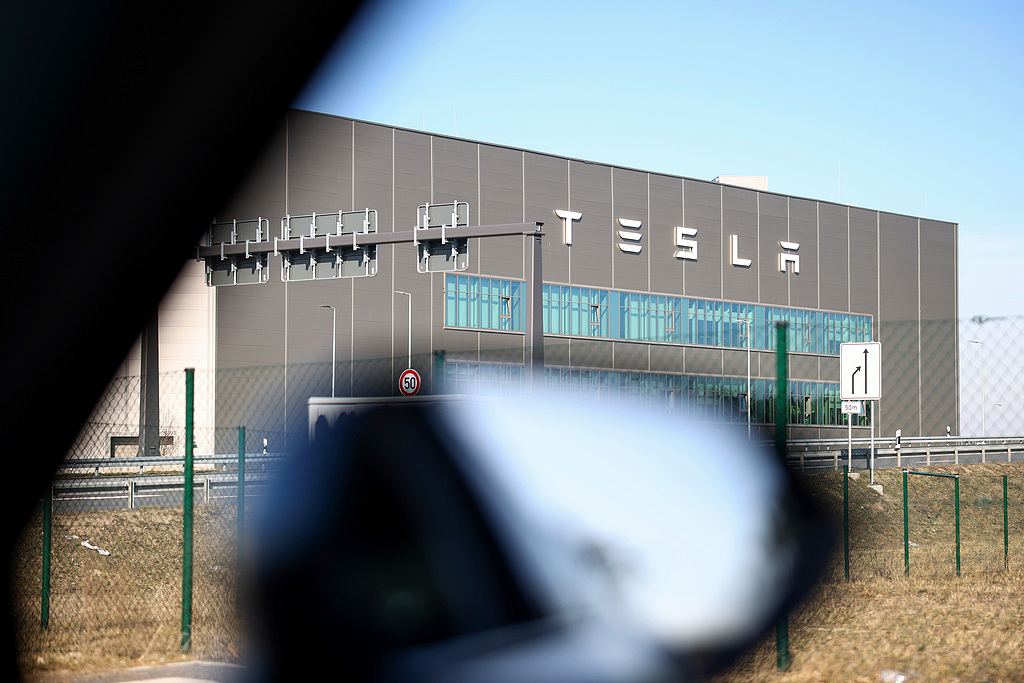
New Chevrolet and Ford vehicles at the Dundalk Marine Terminal at the Port of Baltimore in Baltimore, Maryland, U.S., March 6, 2025. /VCG
New Chevrolet and Ford vehicles at the Dundalk Marine Terminal at the Port of Baltimore in Baltimore, Maryland, U.S., March 6, 2025. /VCG
U.S. President Donald Trump suspended on Thursday the 25 percent tariffs he had imposed this week on most goods from Canada and Mexico. However, these exemptions will expire on April 2, leaving questions about the future direction of U.S. trade policy and its economic consequences.
The initial tariffs were imposed in early February, only to be delayed after a few days. After a brief pause, the tariffs came into effect on March 4. However, on March 5, he issued the exemptions after meeting executives from the top U.S. automakers, Ford, General Motors and Stellantis.
Trump's trade policies have taken a dramatic and fluctuating course in recent months, creating great uncertainty both domestically and internationally. The latest developments have sparked concern, especially within North America.
Canadian Prime Minister Justin Trudeau said that the trade war will not abate soon. In his recent remarks, he stressed that the tensions were a direct result of U.S. actions, noting, "I can confirm that we will continue to be in a trade war that was launched by the United States for the foreseeable future."
Wang Yiwei, director of the Institute of International Affairs at Renmin University of China, sees the tariff fluctuations as a sign of weakness. "Trump's back-and-forth tariff policies are more of a display of bluster than a firm strategy," he said.
He pointed out that if other countries push back, Trump has ample room to back down. He provided the example of the strong economic interdependence between the U.S. and Canada. After Trump imposed tariffs on Canada, Canada quickly retaliated, with Canadian Prime Minister Justin Trudeau announcing a 25 percent tariff on 155 billion Canadian dollars ($107 billion) worth of U.S. goods.
"Once other countries retaliate against U.S. tariffs, it would ultimately hurt American consumers and industries," Wang said.

A "Local Finds" sign at a grocery store in Langford, British Columbia, Canada, February 26, 2025. /VCG
A "Local Finds" sign at a grocery store in Langford, British Columbia, Canada, February 26, 2025. /VCG
U.S. tariffs face global backlash
Currently, public sentiment in Canada and Europe has shifted toward boycotting American goods. Provinces such as Ontario, Quebec and Manitoba have already announced the removal of U.S. alcoholic beverages from shelves, and many Canadians have opted to cancel vacations to the U.S.
"Now is the time to choose products made right here in Canada," Trudeau posted on social media platforms. "Check the labels. Let's do our part. Wherever we can, choose Canada."
Protests have even broken out in sporting events, where fans have loudly booed the U.S. national anthem.
In Europe, particularly in countries like Sweden, Norway and France, tens of thousands of people have joined online movements advocating for a boycott of American products. Facebook groups are urging consumers to substitute everyday items like Coca-Cola, McDonald's and Starbucks with European alternatives. Norwegian company Haltbakk Bunkers has announced that it will stop supplying U.S. military vessels with fuel.
Besides, U.S. companies offering services abroad are also facing significant backlash. American online platforms such as Amazon and Netflix are experiencing growing resistance, with many consumers opting to cancel their subscriptions. In the automotive sector, Tesla's sales in Europe dropped by over 50 percent in January, according to the European Automobile Manufacturers Association.

A Tesla factory in Gruenheide, Germany, March 4, 2025. /VCG
A Tesla factory in Gruenheide, Germany, March 4, 2025. /VCG
Expert: Trump misunderstands global trade dynamics
Experts are increasingly critical of Trump's approach to global trade. Wang said that Trump's actions stem from a flawed perception of globalization. "The U.S. sees itself as being exploited by other countries. Trump even believes that the EU was 'formed to screw the United States,'" Wang said, adding, "This is ridiculous."
He warned that tariffs are unlikely to provide a long-term solution to the structural issues in the U.S. economy.
Other experts also point out that Trump's tariffs are part of a broader political strategy to appease his base, particularly in manufacturing-heavy states. However, they say Trump's measures are unlikely to yield the promised results.
Lv Xiang, an expert at the Chinese Academy of Social Sciences, said that the North American industrial chain, particularly in the automotive sector, is deeply integrated.
"Trump's goal of revitalizing the U.S. auto industry to its past glory is unlikely to be achieved," Lv said. He pointed to the high labor costs and labor shortages in the U.S. "If Canada and Mexico retaliate, U.S. inflation could rise sharply from the current 3 percent to 4 percent or even 5 percent, and there's no effective way to counterbalance such price increases," Lv added.
He also warned that if the tariffs persist, it will not only significantly harm the automotive industry but could also undermine the entire framework of North American economic integration.
Lin Xueping, a visiting researcher at Shanghai Jiao Tong University, echoed Lv's opinion, saying the U.S. ambition to relocate the automotive supply chain from Mexico and Canada back to the U.S. is highly "unrealistic."
She pointed out that U.S. workers earn $35 an hour to assemble a car, while Mexican workers are paid just $4 an hour. Due to high labor costs and the need for a specialized supply chain, it would be nearly impossible for the U.S. to bring the automotive industry back home.
"In the future, U.S. manufacturing will operate in a high-cost, high-price, high-margin environment. Only industries that meet these conditions are likely to remain in the U.S.," Lin noted. She added that if the U.S. government forces manufacturing to stay, it will require sustained government support to keep it afloat, the absence of which will eventually lead to a collapse.




